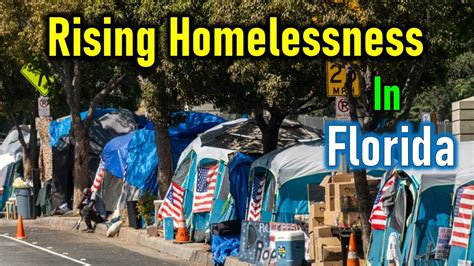
A surge in Florida’s senior homelessness is spotlighted through the plight of 78-year-old Carol, who, after a series of financial setbacks including a costly divorce and health issues, now resides in her car. Her story underscores the growing crisis of elderly individuals facing homelessness in the state, exacerbated by rising housing costs, inflation, and inadequate support systems.
Florida’s escalating housing crisis, coupled with fixed incomes and unexpected medical expenses, is pushing a growing number of senior citizens into homelessness. Carol, a 78-year-old woman from Florida, is a stark example of this disturbing trend. After a life of relative stability, she now finds herself living in her car, navigating the daily challenges of finding safe places to park, accessing basic necessities, and maintaining her dignity. Her story is not unique, reflecting a broader systemic failure to protect the state’s most vulnerable population.
Carol’s journey into homelessness began with a series of unfortunate events that gradually eroded her financial stability. “It was a very expensive divorce,” Carol explained, which significantly depleted her savings. This financial blow was compounded by mounting medical bills and the relentless rise in the cost of living in Florida. Despite working hard throughout her life, Carol found herself unable to keep up with the escalating expenses, eventually leading to the loss of her home and, subsequently, her current living situation in her car.
The challenges Carol faces daily are immense. Finding safe and legal places to park overnight is a constant concern, often forcing her to move locations frequently to avoid unwanted attention or potential legal issues. Access to basic hygiene facilities, such as showers and restrooms, is limited, and maintaining a healthy diet is difficult without proper cooking and refrigeration options. Despite these hardships, Carol remains resilient, relying on the kindness of strangers and the support of local charities to survive.
Carol’s story brings into sharp focus the growing crisis of senior homelessness in Florida. According to recent data, the number of elderly individuals experiencing homelessness in the state has been steadily increasing. Factors contributing to this rise include a severe shortage of affordable housing, stagnant Social Security benefits that fail to keep pace with inflation, and a lack of adequate support services tailored to the needs of older adults. Many seniors, like Carol, are facing homelessness for the first time in their lives, unprepared for the challenges of living on the streets.
The situation is further complicated by the fact that many seniors are reluctant to seek help, either out of pride, fear of government intervention, or a lack of awareness about available resources. This makes it difficult to accurately assess the full extent of the problem and provide targeted assistance to those who need it most. Advocates for the homeless are calling for a more comprehensive and coordinated approach to address the crisis, including increased funding for affordable housing, expanded access to healthcare and social services, and greater efforts to raise awareness about the issue.
Florida’s senior population is particularly vulnerable to economic hardship due to several factors. Many seniors rely on fixed incomes, such as Social Security or pensions, which may not be sufficient to cover the rising costs of housing, healthcare, and other essential expenses. The state’s relatively high cost of living, especially in urban areas, further exacerbates the financial strain on seniors. Unexpected medical emergencies or long-term care needs can quickly deplete savings and leave seniors with few options.
The lack of affordable housing is a major driver of senior homelessness in Florida. The demand for housing far outstrips the supply, driving up rents and home prices. Many seniors on fixed incomes simply cannot afford to compete in the current housing market. Waiting lists for subsidized housing are often years long, leaving many seniors with no immediate options. The problem is particularly acute in areas with large tourist populations, where landlords can often earn more money renting to tourists than to long-term residents.
The consequences of senior homelessness are severe. In addition to the obvious challenges of finding shelter, food, and hygiene facilities, homeless seniors are at increased risk of health problems, including exposure to the elements, malnutrition, and infectious diseases. They are also more vulnerable to violence and exploitation. The stress of living on the streets can take a significant toll on their mental health, leading to depression, anxiety, and social isolation. The life expectancy of homeless individuals is significantly lower than that of the general population.
Addressing the crisis of senior homelessness in Florida requires a multifaceted approach that addresses both the immediate needs of homeless seniors and the underlying systemic issues that contribute to the problem. This includes providing emergency shelter and supportive services to those currently experiencing homelessness, as well as increasing the supply of affordable housing and strengthening the social safety net to prevent future homelessness. It also requires greater collaboration between government agencies, non-profit organizations, and the private sector to develop and implement effective solutions.
Several organizations in Florida are working to address the crisis of senior homelessness. These organizations provide a range of services, including emergency shelter, food assistance, medical care, case management, and housing assistance. They also advocate for policies that promote affordable housing and protect the rights of homeless individuals. However, these organizations are often underfunded and overwhelmed by the demand for their services. Increased funding and support are needed to enable them to effectively address the growing crisis of senior homelessness in Florida.
The state government has a responsibility to address the crisis of senior homelessness in Florida. This includes increasing funding for affordable housing, expanding access to healthcare and social services, and enacting policies that protect the rights of homeless individuals. The state can also work with local governments and non-profit organizations to develop and implement innovative solutions to the problem. Addressing the crisis of senior homelessness is not only a moral imperative but also an economic one. The costs of providing emergency services to homeless individuals far outweigh the costs of providing affordable housing and preventative care.
The story of Carol serves as a wake-up call to the growing crisis of senior homelessness in Florida. Her experience highlights the vulnerability of elderly individuals in the face of economic hardship and the need for a more comprehensive and compassionate response to this growing problem. By working together, government agencies, non-profit organizations, and the private sector can develop and implement solutions that ensure that all seniors have access to safe, affordable housing and the support they need to live with dignity.
The root causes of senior homelessness are complex and interconnected, ranging from individual vulnerabilities to systemic failures. Understanding these underlying factors is essential for developing effective solutions.
- Poverty and Income Inequality: Many seniors live on fixed incomes that are insufficient to cover the rising costs of housing, healthcare, and other essential expenses. The gap between income and expenses is widening, leaving many seniors at risk of homelessness.
- Lack of Affordable Housing: The shortage of affordable housing is a major driver of senior homelessness. The demand for housing far outstrips the supply, driving up rents and home prices. Many seniors on fixed incomes simply cannot afford to compete in the current housing market.
- Healthcare Costs: Unexpected medical emergencies or long-term care needs can quickly deplete savings and leave seniors with few options. The high cost of healthcare in the United States is a major burden for many seniors, particularly those with chronic illnesses.
- Loss of Social Support: The loss of a spouse, family member, or friend can leave seniors feeling isolated and vulnerable. Social isolation can make it difficult for seniors to access resources and support, increasing their risk of homelessness.
- Mental Health Issues: Mental health issues, such as depression, anxiety, and substance abuse, can contribute to homelessness. Seniors with mental health issues may have difficulty managing their finances, maintaining relationships, and accessing services.
- Domestic Violence: Domestic violence can lead to homelessness, particularly for women. Seniors who experience domestic violence may be forced to leave their homes and seek shelter elsewhere.
- Natural Disasters: Natural disasters, such as hurricanes and floods, can displace seniors and leave them homeless. The increasing frequency and intensity of natural disasters are exacerbating the problem of senior homelessness.
- Lack of Awareness: Many seniors are unaware of the resources and support services that are available to them. This lack of awareness can prevent them from accessing the help they need to avoid homelessness.
- Stigma and Shame: The stigma associated with homelessness can prevent seniors from seeking help. Many seniors are ashamed of their situation and reluctant to ask for assistance.
- Ageism: Ageism can contribute to homelessness by making it difficult for seniors to find employment and housing. Employers and landlords may discriminate against seniors, making it harder for them to maintain their independence.
Addressing these root causes requires a comprehensive and coordinated approach that involves government agencies, non-profit organizations, the private sector, and individual citizens.
To effectively address the senior homelessness crisis, a range of solutions must be implemented at the individual, community, and systemic levels.
- Prevention Strategies:
- Financial Assistance Programs: Expanding financial assistance programs, such as rent subsidies, utility assistance, and food stamps, can help seniors maintain their housing and avoid homelessness.
- Affordable Housing Development: Investing in the development of affordable housing units specifically designed for seniors can increase the supply of housing and reduce the risk of homelessness.
- Counseling and Education: Providing counseling and education programs on financial literacy, healthcare management, and housing rights can empower seniors to make informed decisions and avoid financial crises.
- Early Intervention Services: Implementing early intervention services, such as home visits and case management, can identify seniors at risk of homelessness and provide them with the support they need to stay housed.
- Emergency Assistance:
- Emergency Shelters: Expanding the availability of emergency shelters specifically designed for seniors can provide a safe and temporary place to stay for those who are experiencing homelessness.
- Rapid Rehousing Programs: Implementing rapid rehousing programs can quickly move homeless seniors into permanent housing by providing rental assistance and case management services.
- Transitional Housing: Providing transitional housing can offer a structured environment for homeless seniors to develop the skills and resources they need to live independently.
- Street Outreach Teams: Deploying street outreach teams can connect with homeless seniors, assess their needs, and provide them with referrals to services.
- Long-Term Solutions:
- Permanent Supportive Housing: Developing permanent supportive housing units that combine affordable housing with on-site supportive services can provide a stable and supportive environment for homeless seniors with chronic illnesses or disabilities.
- Increased Social Security Benefits: Increasing Social Security benefits can provide seniors with a more adequate income and reduce their risk of homelessness.
- Expanded Healthcare Access: Expanding access to healthcare services, including mental health care and substance abuse treatment, can improve the health and well-being of homeless seniors.
- Job Training and Placement: Providing job training and placement services can help seniors find employment and increase their income.
- Legal Assistance: Offering legal assistance to seniors can help them resolve legal issues that may be contributing to their homelessness.
- Community Involvement:
- Volunteer Opportunities: Creating volunteer opportunities for community members to assist homeless seniors can provide them with much-needed support and companionship.
- Donations: Encouraging donations of food, clothing, and other essential items can help meet the basic needs of homeless seniors.
- Advocacy: Advocating for policies that promote affordable housing and protect the rights of homeless individuals can help create a more just and equitable society.
- Education: Educating the public about the issue of senior homelessness can help reduce stigma and increase awareness.
By implementing these solutions, we can create a more compassionate and effective system of care for homeless seniors and ensure that all seniors have access to safe, affordable housing and the support they need to live with dignity.
The long-term implications of failing to address the senior homelessness crisis are significant and far-reaching, impacting not only the individuals affected but also the community as a whole.
- Increased Healthcare Costs: Homeless seniors are more likely to experience health problems, including chronic illnesses, mental health issues, and infectious diseases. This leads to increased healthcare costs for the community, as homeless seniors often rely on emergency room visits and other expensive forms of care.
- Increased Demand for Social Services: Homeless seniors require a wide range of social services, including emergency shelter, food assistance, case management, and housing assistance. This puts a strain on already limited resources and can lead to long waiting lists and inadequate levels of service.
- Decreased Community Safety: Homelessness can contribute to increased crime and public disorder. Homeless seniors may be more vulnerable to violence and exploitation, and their presence in public spaces can create a sense of unease and insecurity.
- Erosion of Social Cohesion: The presence of visible homelessness can erode social cohesion and create divisions within the community. Residents may become less likely to trust and support each other, leading to a decline in civic engagement and social capital.
- Economic Costs: Homelessness can have significant economic costs, including lost productivity, increased law enforcement expenses, and decreased property values. Addressing homelessness is not only a moral imperative but also an economic one.
- Intergenerational Impacts: The experience of homelessness can have intergenerational impacts, particularly for seniors who have children or grandchildren. Children who witness their parents or grandparents experiencing homelessness may be more likely to experience emotional and behavioral problems, as well as academic difficulties.
- Moral Costs: Failing to address the senior homelessness crisis is a moral failure. It is a reflection of our society’s inability to care for its most vulnerable members and to ensure that all individuals have access to basic necessities.
Addressing the senior homelessness crisis is an investment in the future. By providing seniors with safe, affordable housing and the support they need to live with dignity, we can improve their health and well-being, reduce healthcare costs, increase community safety, and strengthen social cohesion. It is a win-win situation for everyone involved.
Florida’s unique demographic and economic factors contribute to the state’s particularly acute senior homelessness crisis.
- Large Senior Population: Florida has one of the largest senior populations in the United States, with a significant proportion of residents aged 65 and older. This demographic trend creates a greater demand for affordable housing and social services for seniors.
- Rapid Population Growth: Florida is one of the fastest-growing states in the country, attracting new residents from all over the world. This rapid population growth is putting a strain on the state’s infrastructure and resources, including affordable housing.
- High Cost of Living: Florida has a relatively high cost of living, particularly in urban areas. Housing costs, healthcare expenses, and transportation costs are all higher than the national average. This makes it difficult for seniors on fixed incomes to afford basic necessities.
- Tourism Industry: Florida’s thriving tourism industry drives up housing costs and makes it more difficult for long-term residents to find affordable housing. Landlords can often earn more money renting to tourists than to long-term residents, reducing the availability of affordable housing for seniors.
- Lack of Affordable Housing: Florida has a severe shortage of affordable housing, particularly for seniors. The demand for housing far outstrips the supply, driving up rents and home prices. Waiting lists for subsidized housing are often years long, leaving many seniors with no immediate options.
- Vulnerability to Natural Disasters: Florida is vulnerable to natural disasters, such as hurricanes and floods, which can displace seniors and leave them homeless. The increasing frequency and intensity of natural disasters are exacerbating the problem of senior homelessness.
- Limited Social Safety Net: Florida has a relatively weak social safety net, with limited funding for programs that assist low-income seniors. This makes it more difficult for seniors to access the resources and support they need to avoid homelessness.
- Conservative Political Climate: Florida has a conservative political climate, which can make it difficult to enact policies that support affordable housing and social services for seniors.
Addressing the senior homelessness crisis in Florida requires a comprehensive and coordinated approach that takes into account the state’s unique demographic and economic factors. This includes increasing funding for affordable housing, expanding access to healthcare and social services, and enacting policies that protect the rights of homeless individuals.
Frequently Asked Questions (FAQ)
1. What factors contribute to senior homelessness in Florida?
Several factors contribute to the growing crisis of senior homelessness in Florida. These include the rising cost of living, particularly housing, stagnant Social Security benefits that don’t keep pace with inflation, unexpected medical expenses, expensive divorces, and a general lack of affordable housing options. Many seniors are on fixed incomes, making them particularly vulnerable to economic downturns and unexpected financial burdens.
2. What specific challenges do homeless seniors face in Florida?
Homeless seniors in Florida face numerous challenges. Finding safe and legal places to sleep is a constant struggle. Access to basic hygiene facilities, such as restrooms and showers, is limited. They are at increased risk of health problems due to exposure to the elements and lack of access to healthcare. They are also vulnerable to violence, exploitation, and social isolation. The summer heat in Florida poses additional health risks, such as heatstroke.
3. What resources are available to assist homeless seniors in Florida?
Several organizations in Florida offer assistance to homeless seniors. These organizations provide a range of services, including emergency shelter, food assistance, medical care, case management, and housing assistance. Examples include local homeless coalitions, non-profit organizations that focus on senior services, and some government programs. However, resources are often limited, and demand exceeds availability.
4. What can be done to address the senior homelessness crisis in Florida?
Addressing senior homelessness in Florida requires a multi-faceted approach. This includes increasing funding for affordable housing, expanding access to healthcare and social services, raising awareness about the issue, and implementing preventative measures to help seniors avoid homelessness in the first place. Collaboration between government agencies, non-profit organizations, and the private sector is essential to develop and implement effective solutions. Policy changes are needed to protect vulnerable populations.
5. How can I help seniors experiencing homelessness in Florida?
There are several ways to help seniors experiencing homelessness in Florida. You can donate to local charities that provide services to the homeless. You can volunteer your time to assist with outreach efforts or provide direct support to seniors in need. You can advocate for policies that promote affordable housing and protect the rights of homeless individuals. Raising awareness about the issue among your friends, family, and community members is also crucial.









